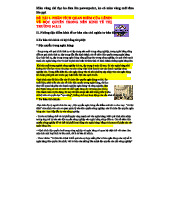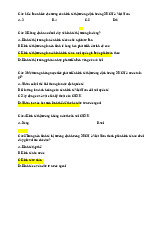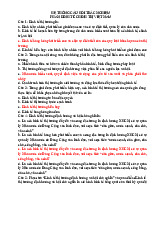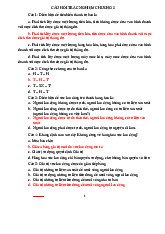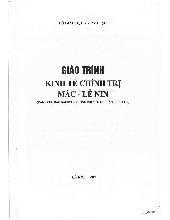








Preview text:
lOMoAR cPSD| 44820939 B-BAE COURSE SYLLABUS 1. GENERAL INFORMATION
Course Title (in Vietnamese): Kinh tế chính trị Mác Lênin
Course Title (in English): Marxist-Leninist Political Economics Course code: Number of credits : 2 Theoretical
lessons : 20 Practical lessons : 10
Prerequisite: Philosophy of Marxism and Leninism.
2. INSTRUCTOR’S INFORMATION
Full name: NGUYỄN THỊ THANH HIẾU Tittle: Assoc. Prof., Ph.D
Address: Building A1, Room 1014 Phone number: 0948109779 Email:: hieunt@neu.edu.vn
Faculty/ Institute: Faculty of Political Theory 3. COURSE DESCRIPTIONS
This module consists of 6 chapters, in which, chapter 1 discusses the research objects,
methods and functions of Marxist-Leninist Political Economics, chapters 2 to 6 present the
core content of Marxist-Leninist Political Economics according to the subject's target. There
are specific issues such as: commodities, markets and the role of market participants;
producing surplus value in a market economy; competition and monopoly in the market
economy; socialist-oriented market economy and relations of economic interests;
industrialization, modernization and international economic integration of Vietnam.
CHAPTER 1: RESEARCH SUBJECTS, METHODS AND FUNCTIONS OF POLITICAL
ECONOMICS OF MARXISM AND LENINISM
CHAPTER 2: COMMODITIES, MARKET AND ROLE OF MARKET PARTICIPANTS
CHAPTER 3: SURPLUS VALUE IN THE MARKET ECONOMY
CHAPTER 4: COMPETITION AND MONOLLY IN THE MARKET ECONOMY
CHAPTER 5: SOCIALIST ORIENTED MARKET ECONOMY AND ECONOMIC INTERESTS IN VIETNAM
CHAPTER 6: VIETNAM'S INDUSTRIALIZATION, MODERNIZATION AND
INTERNATIONAL ECONOMIC INTEGRATION
4. LEARNING RESOURCES: - Course book:
Ministry of Education and Training (2021), Textbook of Political Economics of Marxism
and Leninism (For ungraduated level without majoring in political theory), National Political
Publishing House, Hanoi 2021 - Reference books: lOMoAR cPSD| 44820939
. The basic principles of Marxism-Leninism (For university and college students without
majoring in Marxism-Leninism, Ho Chi Minh's thought - Reprint, revised and
supplemented), National Political Publishing House, 2010.
. The Central Council directs the compilation of national textbooks on Marxist-Leninist
sciences and Ho Chi Minh Thought (2013), Textbook of Political Economics of Marxism and
Leninism (Revised Edition), National Political Publishing House, Hanoi
. Textbook of Political Economics of Marxism and Leninism on the transition to socialism in
Vietnam, National Political Publishing House, Hanoi, 2001.
- Other required materials and information:
NEU’s eBooks and documents at http://lic.neu.edu.vn/
5. COURSE LEARNING OUTCOMES (CLOs) CLO Descriptions CLO1.1: -
Understanding K.Marx's theory of labor value through basic
categoriesof commodities, currency, prices, the law of the value of
commodities, duality of labor producing commodities, and labor
productivity....; helping students perceive in a fundamental way about the
theoretical basis of economic relationships in the market economy. -
Understanding K.Marx's theory of surplus value production in
thecapitalist competitive free market economy in order to see the most
basic interest relationships through the new value distribution created by
labor among the basic actors in the market economy CLO1.2: CLO 1 -
Understanding the theory of V.I Lenin on monopoly and state
monopolyin the capitalist market economy, understanding the context of
the world economy with new characteristics CLO1.3: -
Acquiring the basic knowledge of the socialist-oriented market
economyin Vietnam and the interest relationships in the socialist-oriented market economy in Vietnam. -
Understanding the objective necessity and the process
ofindustrialization- modernization and international economic integration in Vietnam. CLO 2 CLO 2.1: 2 lOMoAR cPSD| 44820939
Forming skills to protect their own legitimate interests, knowing how to
deal with their interest relationships in relation to the interests of
employees, and to the interests of society scientifically and rationally when
starting a business or participate in socio-economic activities in modern society. CLO 2.2:
- Forming the mindset of applying fundamental theory into solving
economic problems when participating in socio-economic relations and
interest relationships in the market economy
-Forming the mindset of solving beneficial relations between Vietnam and
other countries in the world through the international economic integration
in the current challenging context. CLO 3.1:
Having the ability to self-study, self-research materials to complete
assigned lessons and assignments. CLO 3 CLO 3.2:
Becoming a global citizen who is ready to act positively and demonstrate social responsibility 6. COURSE ASSESSMENT
Table 6.1. Course Assessments Assessment Weight Description methods Timing CLOs (%) [1] [2] [3] [4] [5] Class
Attending all lessons (absences more than CLO1.
Participation 20% of the total course hours is not allowed) 1
Class participation grade will be based on CLO1.
general class attendance, contribution in 2
class and compliance with the class rules Week CLO1.
delineated below. Poor class attendance, 10% 115 3
little contribution in class or noncompliance CLO2.
with class rules will result in a poor class 1 participation grade. CLO2. 2 Individual Complete individual Week CLO1. 40%
Assignments assignments/presentations 10 1 Scores of individual CLO1.
assignments/presentations account for 40% 2 of the total subject score. CLO1. 3 CLO2. lOMoAR cPSD| 44820939 1 CLO2. 2 CLO1. 1 Essay exam. CLO1.
90-minute final exam. Students have 2
permission to take the final exam when they ISME’s CLO1. Final Exam 50%
attend more than 80% of the total classes and schedule 3
hand in both individual assignments/ present CLO2. on time. 1 CLO2. 2
7. LESSON PLAN (Any changes on the schedule WILL BE announced in class and on TURNITIN in advance) Table 7.1. Lesson plan Week/ Content Reading Activities Session
(Specify 2 levels of detail) [1] [2] [3] [4]
Chapter 1: Objects, research Course Chapter 1 (Ministry methods and functions of Introduction, of Education and
MarxistLeninist political economy Set learning Training, 2021, pp. I.
Overview of the formation requirements, 11-33)
anddevelopment of the Marxist- Lecturing Leninist political economy theory, II. Objects, purposes and
researchmethods of the Marxist- The Leninist political economy teacher III.
The function of Marxist- assigns Week 1 Leninist political economy the topic of the mid- term assignment/pre sentations, Guiding students through the content and form 4 lOMoAR cPSD| 44820939
Week 2 Chapter 2: Commodities, markets Students read Chapter 2 (Ministry
and the role of market participants I. the article of Education and K.Marx's theory on commodity before Training, 2021, pp. production attending class, 34-56) Lecturer in theory, Discussing situations and questions asked by the teacher
Students read Chapter 2 (Ministry the article of Education and before Training, 2021, pp.
Chapter 2: Commodities, markets attending class, 56-83)
and the role of market participants Lecturer in
Week 3 II.Market and market economy theory, III.The role of some market Discussing participants situations and questions asked by the teacher Students read the article before
attending class, Chapter 3 (Ministry
Chapter 3: Surplus value in a Lecturer in Week of Education and market economy theory, 4,5 Training, 2021, pp.
I. K.Marx's theory of surplus value Discussing 84-104) situations and questions asked by the teacher lOMoAR cPSD| 44820939 Students read the article before
attending class, Chapter 3 (Ministry
Chapter 3: Surplus value in a Lecturer in of Education and Week 6 market economy theory, Training, 2021, pp. II.Capital accumulation Discussing 104-109) situations and questions asked by the teacher Week
Chapter 3: Surplus value in a Students read Chapter 3 (Ministry market economy the article
III.Expression forms of surplus before value attending class, Lecturer in of Education and theory, 7,8 Training, 2021, pp. Discussing 109-123) situations and questions asked by the teacher
Students read Chapter 4(Ministry the article of Education and
Chapter 4: Competition and before Training, 2021, pp.
Monopoly in a Market Economy attending class, 124-149)
I.Competition at monopolistic level Lecturer in in a market economy Week 9 theory,
II.Lenin's theory and economic Discussing
characteristics of monopoly and situations and
state monopoly in capitalist market questions asked economy by the teacher 6 lOMoAR cPSD| 44820939
Students read Chapter 4 (Ministry the article of Education and before Training, 2021, pp.
Chapter 4: Competition and attending class, 149-168)
Monopoly in a Market Economy Lecturer in Week
III.New expression of monopoly, theory, 10 state monopoly in today's Discussing
conditions, historical role of situations and capitalism questions asked by the teacher Week Chapter 5:
Socialist-oriented Students read Chapter 5 (Ministry 11
market economy and economic the article of Education and
interest relations in Vietnam before Training, 2021, pp. I. Socialist-oriented attending class, 169-187)
market economy in Vietnam Lecturer in theory, Discussing situations and questions asked by the teacher
Students read Chapter 5 (Ministry Chapter 5:
Socialist-oriented the article of Education and
market economy and economic before Training, 2021,
interest relations in Vietnam attending class, pp.187-223) II. Improving the socialist- Lecturer in Week
orientedmarket economy institution theory, 12 in Discussing Vietnam situations and III. Economic interests in questions Vietnam asked by the teacher lOMoAR cPSD| 44820939
Students read Chapter 6 (Ministry the article of Education and before Training, 2021, pp. Chapter 6:
Vietnam's attending class, 224-259) industrialization,
modernization Lecturer in Week
and international economic theory, 13 integration Discussing I. Industrialization and situations and modernization in Vietnam questions asked by the teacher
Students read Chapter 6 (Ministry the article of Education and before Training, 2021, pp. Chapter 6:
Vietnam's attending class, 260-286) industrialization,
modernization Lecturer in Week
and international economic theory, 14 integration Discussing
II. International economic situations and integration in Vietnam questions asked by the teacher - Systematizatio n of basic Week knowledge Review 15 - Correcting the midterm exercises
8. COURSE REQUIREMENT & EXPECTATION Assignment and Exam
There are 1 individual assignment/ presentation and 1 final exam which account for 40% and
50% of total grade respectively. Students have permission to take the final exam when they
attend more than 80% of the total classes, hand in the individual assignment/ presentation.
The following rules apply to exams:
1. Make a notation of the exam dates.
2. Final exam is an open-book exam in which textbooks and notebooks are allowed. No
technology will be allowed during the exam. You must turn off all cell phones or any other personal technology.
3. Bring students’ cards with you to the exam
4. No food or drinks will be allowed during an exam.
5. When time is up and the examiner calls out, stop writing. 8 lOMoAR cPSD| 44820939
6. Please make sure you do not engage in any behavior that may appear to be cheating.Late Assignments
Assignments/ presentations are due by the date and time specified in the assignment/
presentations. Late assignments will be penalized 10% per calendar day (not merely per class
period) beginning with the due date. After three late days, acceptance of the assignment is at
my discretion. No extensions, no exceptions. It is your responsibility to know the due dates and to plan accordingly. Class Participation
Class participation points will be based on general class attendance, contribution in class and
compliance with the class rules delineated below. Poor class attendance, little contribution in
class or non-compliance with class rules will result in a poor class participation grade. Below are class rules:
1. Arrive on time and be seated and ready to begin when the class begins. If you do arrive latefor
more than 30 minutes, you will not be counted for that class. Note that this class is intended for registered students only.
2. Students are responsible for attending all classes. In case of absence due to force
majeurereasons, sufficient and reasonable proofs must be provided.
3. Students who are absent for more than 2 sessions without reasonable proofs are consideredto
have failed to complete the course.
4. Come prepared – read the readings assigned.
5. NO MOBILE PHONES during classes.
6. Do not engage in individual discussions
7. Participate by contributing comments and questions during the discussions. The instructorwill
call on students during the class if participants do not volunteer.
8. Please use common courtesy and polite manners in class. Communication:
I encourage your discussion with me. I prefer email or in class discussions. You also are
welcome to make separate appointments. I will be available before and after class, but only
for short questions. I also encourage feedback on the classes, lectures, teaching and reading
material. We enhance the class every semester and your thoughts are valuable in the process.
9. APPROVEMENT DATE: …………………….. ISME’s Dean B-BAE Academic Instructor
(Ký và ghi rõ họ tên) Commitee
(Ký và ghi rõ họ tên) Assoc. Prof., Ph.D Nguyen Thi Thanh Hieu
